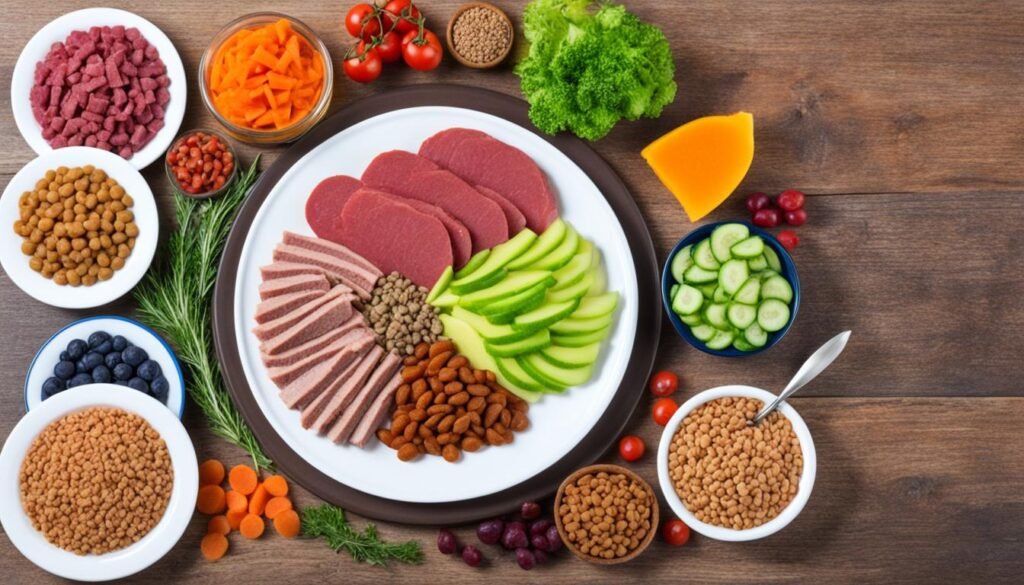SHORT ANSWER: Yes, and Absolutely! Can Dogs eat Kidney Meat , but you should to read the article to know more information ...
Many dog owners wonder if it is safe for their furry friends to consume kidney meat. Kidney meat can offer various benefits for dogs, but it is essential to understand the precautions and potential risks associated with feeding it to your canine companion.
Key Takeaways:
- Dogs can safely eat kidney meat, but it is crucial to consider their individual needs and consult with a veterinarian.
- Kidney meat is rich in essential nutrients such as vitamins, minerals, and protein, which can support your dog’s overall health.
- Feeding kidney meat to your dog should be part of a balanced diet that meets their specific dietary requirements.
- While kidney meat can be beneficial, certain precautions, such as proper preparation and portion control, should be followed to ensure your dog’s safety.
- Not all dogs can tolerate kidney meat, especially those with existing health conditions. It is important to consider your dog’s individual circumstances before introducing kidney meat into their diet.
Nutritional Value of Kidney Meat for Dogs
When it comes to your dog’s diet, providing nutritious food is essential for their overall health and well-being. One protein source that offers a significant nutritional value for dogs is kidney meat. Kidney meat is rich in essential vitamins, minerals, and other nutrients that can support your furry friend’s healthy diet.
Kidney meat is packed with essential vitamins, including vitamin A, vitamin C, and various B vitamins. These vitamins play a crucial role in promoting healthy growth, maintaining a strong immune system, and supporting optimal organ function in dogs.
In addition to vitamins, kidney meat is also abundant in minerals that are vital for your dog’s health. It contains significant amounts of iron, zinc, phosphorous, and selenium. These minerals contribute to the development and maintenance of healthy bones, teeth, muscles, and overall bodily functions in dogs.
One noteworthy feature of kidney meat is its high protein content. Protein is crucial for dogs as it provides the building blocks for muscle and tissue repair, growth, and maintenance. It is especially beneficial for active dogs or those in their growth stages.
Kidney meat is not only a rich source of vital nutrients, but it is also low in fat and calories, making it an excellent choice for dogs on a weight management plan. It provides essential nutrients without excessive calorie intake, helping to maintain a healthy body weight for your four-legged companion.
When incorporating kidney meat into your dog’s diet, it’s essential to consider their specific nutritional needs, dietary restrictions, and any pre-existing health conditions. Remember to consult with your veterinarian to ensure kidney meat is suitable and safe for your dog.
Overall, kidney meat offers significant nutritional value for dogs. Its abundance of vitamins, minerals, protein, and low-fat content make it a nutritious addition to your dog’s diet. However, as with any dietary change, it’s crucial to consult with a professional to determine the appropriate portion sizes and feeding recommendations for your individual pet.
The Benefits of Kidney Meat for Dogs:
- Rich in essential vitamins such as vitamin A and vitamin C, supporting immune system health
- Abundant in minerals like iron, zinc, and phosphorous, contributing to healthy bones and bodily functions
- High protein content, supporting muscle development and repair
- Low in fat and calories, making it suitable for weight management
Adding kidney meat to your dog’s diet can provide a range of essential nutrients to support their overall health and vitality.
The Role of Kidney Meat in a Balanced Diet for Dogs
When it comes to providing a balanced diet for dogs, it is essential to consider their dietary needs. Dogs require a combination of proteins, carbohydrates, fats, vitamins, and minerals to maintain optimal health and wellbeing.
Kidney meat, also known as offal, can play a significant role in meeting dogs’ dietary needs. It is a nutrient-dense organ meat that offers various benefits for dogs when incorporated into their diet in appropriate amounts.

A plate with sliced kidney meat next to other balanced dog food options such as vegetables, fruits, and grains. The plate should be set on a clean surface and have a colorful and inviting arrangement of food. The kidney meat should be cooked and have a rich color and texture.
Nutritional Value of Kidney Meat:
Kidney meat is rich in essential nutrients that contribute to a dog’s overall health. It is an excellent source of protein, which is vital for muscle growth, repair, and development. Additionally, kidney meat provides essential vitamins and minerals, including vitamin A, vitamin C, iron, zinc, and selenium.
“The high nutritional value of kidney meat makes it an excellent addition to a balanced diet for dogs. It helps fulfill their dietary requirements and supports their overall well-being.” – Dr. Emily Thompson, veterinarian
Meeting Dogs’ Dietary Needs:
Dogs have specific dietary needs that can be met by incorporating kidney meat into their diet. The protein content in kidney meat helps maintain muscle mass and supports the development of strong bones and teeth. The vitamins and minerals present in kidney meat aid in various bodily functions, including immune system function, cell growth, and energy metabolism.
Including kidney meat in a balanced diet for dogs can improve their overall nutrition and contribute to their overall health and vitality. However, it is crucial to consider the appropriate portion size and frequency of feeding kidney meat to avoid any potential health risks.
Considerations for Feeding Kidney Meat:
- Consult with a veterinarian: Before incorporating kidney meat or any new food into your dog’s diet, it is essential to consult with a veterinarian. They can provide personalized recommendations based on your dog’s breed, age, size, and overall health condition.
- Balance and variety: While kidney meat can offer significant nutritional benefits, it should be part of a balanced and varied diet. Combine it with other high-quality protein sources, carbohydrates, and healthy fats to ensure a well-rounded meal for your dog.
- Preparation and cooking: When preparing kidney meat for dogs, it is crucial to cook it thoroughly to avoid the risk of bacterial contamination. Avoid using excessive seasonings or additives that may be harmful to dogs.
Incorporating kidney meat into a balanced diet for dogs can be beneficial for their overall health and wellbeing. However, it is essential to consider their specific dietary needs, consult with a veterinarian, and ensure proper preparation and portion control. By providing a well-rounded diet, including kidney meat, dog owners can support the long-term health and vitality of their furry companions.
Potential Risks and Precautions of Feeding Dogs Kidney Meat
While kidney meat can provide valuable nutrients for dogs, it is important to be aware of the potential risks associated with its consumption. Understanding these risks and taking necessary precautions can help ensure the safe inclusion of kidney meat in your dog’s diet.
Risks of Kidney Meat for Dogs
- 1. High Phosphorus Levels: Kidney meat is naturally high in phosphorus, which can be problematic for dogs with kidney disease or those at risk of developing it. Excessive phosphorus intake can further strain the kidneys and potentially worsen their condition.
- 2. Bacterial Contamination: Raw or improperly cooked kidney meat may contain harmful bacteria, such as Salmonella or E. coli, which can cause digestive issues and even serious infections in dogs.
- 3. Urinary Tract Issues: Some dogs may be prone to developing urinary tract issues, such as bladder stones or urinary tract infections. The high phosphorus content in kidney meat can contribute to the formation of these issues.
Precautions for Dogs Consuming Kidney Meat
- 1. Consult with a Veterinarian: Before incorporating kidney meat into your dog’s diet, consult with a veterinarian to assess your dog’s specific health needs and determine if kidney meat is appropriate.
- 2. Cook Thoroughly: If feeding kidney meat to your dog, ensure it is thoroughly cooked to eliminate any potential bacterial contamination. Raw kidney meat should be strictly avoided.
- 3. Moderation is Key: As with any food, moderation is important. Keep portion sizes of kidney meat appropriate for your dog’s size, age, and dietary requirements.
- 4. Monitor Urinary Health: Regularly monitor your dog’s urinary health and seek veterinary advice if you notice any changes or concerns, especially if your dog is susceptible to urinary tract issues.
Remember, every dog is unique, and individual health factors should always be taken into account before making dietary decisions. When in doubt, consult with a veterinarian to ensure the well-being of your furry companion.
To illustrate the potential risks associated with feeding dogs kidney meat, refer to the following image:
Can All Dogs Eat Kidney Meat?
When it comes to feeding our beloved canine companions, it is essential to consider their individual needs and dietary requirements. While kidney meat can be a nutritious addition to a dog’s diet, not all dogs may be able to safely consume it.
Age, breed, and individual health conditions can play a role in determining whether a dog can eat kidney meat without any adverse effects. Puppies, for instance, have specific nutritional requirements that need to be met to support their growth and development. Therefore, consulting with a veterinarian is crucial to ensure that kidney meat is suitable for a growing puppy.
Similarly, certain dog breeds may have a predisposition to specific health conditions that necessitate dietary modifications. From renal disorders to food allergies, understanding your dog’s breed-specific health concerns can help determine whether kidney meat fits into their nutritional plan.
It’s important to note that kidney meat contains higher levels of certain nutrients, such as protein and phosphorus, which can be excessive for dogs with kidney or liver issues. If your dog has any pre-existing health conditions, it is best to consult with a veterinarian before incorporating kidney meat into their diet. They can provide tailored advice based on your dog’s unique needs.
Every dog is an individual, and what may work for one may not work for another. Therefore, observing your dog’s response to the introduction of kidney meat is crucial. If you notice any digestive issues, such as upset stomach or diarrhea, it may be an indication that kidney meat does not agree with your dog.
Quote: “Feeding your dog a balanced, well-rounded diet is essential for their overall health. While kidney meat can offer nutritional benefits, it may not be suitable for every dog. Always consult with a veterinarian to determine the best diet for your canine companion.” – Dr. Sarah Miller, DVM
When introducing kidney meat to your dog’s diet, it is essential to do so gradually. Start by offering small portions and monitor your dog’s reaction. If they tolerate it well and show no adverse effects, you can gradually increase the amount over time.
Remember, kidney meat should not be the sole source of nutrition for your dog. It should be part of a balanced diet that includes a variety of protein sources, fruits, vegetables, and other essential nutrients that fulfill their dietary requirements.
Understanding whether all dogs can safely eat kidney meat requires careful consideration of individual factors such as age, breed, and health conditions. By consulting with a veterinarian and monitoring your dog’s response, you can determine whether kidney meat is a suitable addition to their diet.
Preparing and Serving Kidney Meat for Dogs
When it comes to preparing and serving kidney meat for your furry friend, there are a few key considerations to keep in mind. By following these guidelines, you can ensure that your dog receives the nutritional benefits of kidney meat in a safe and enjoyable way.
1. Choosing Quality Kidney Meat
Start by selecting high-quality kidney meat from a trusted source. Look for fresh, organically sourced meats that are free from any additives or preservatives. The quality of the meat will directly impact the health benefits it provides to your dog.
2. Cooking Methods
There are various cooking methods you can use to prepare kidney meat for your four-legged friend. You can opt to boil, steam, or bake the meat. It’s important to cook the meat thoroughly to ensure it is safe for consumption. Avoid seasoning the meat with any ingredients that may be harmful to dogs, such as onions or garlic.
3. Portion Sizes
When serving kidney meat to your dog, it’s essential to consider portion sizes. The appropriate serving size will depend on your dog’s size, age, and overall health. It is recommended to consult with your veterinarian to determine the appropriate portion size for your specific dog.
4. Enhancements and Accompaniments
You can enhance the nutritional value and taste of kidney meat by incorporating other dog-friendly ingredients. For example, you can serve kidney meat with steamed vegetables like carrots or green beans, which add additional vitamins and fiber to your dog’s diet.
“Properly preparing and serving kidney meat is key to ensuring your dog can safely enjoy the benefits it offers. By following these guidelines, you can provide a nutritious and satisfying meal for your furry companion.”
Remember, while kidney meat can be a nutritious addition to your dog’s diet, it should always be served as part of a balanced meal plan. It is crucial to consult with your veterinarian to ensure that kidney meat is suitable for your dog and to get personalized advice on incorporating it into their diet.
Next, we will explore alternative options for dogs with dietary restrictions or preferences that prevent them from consuming kidney meat. Stay tuned for Section 7 to learn more about the available alternatives to kidney meat for your canine companion.
Alternatives to Kidney Meat for Canine Diets
While kidney meat can be a beneficial addition to a dog’s diet, some dogs may have dietary restrictions or preferences that prevent them from consuming it. Fortunately, there are alternative options available that can provide similar benefits. Here, we will explore some protein sources that can serve as alternatives to kidney meat in canine diets:
- Poultry: Chicken and turkey are excellent alternatives to kidney meat. They are lean sources of protein and are easily digestible for dogs.
- Beef: Lean cuts of beef, such as sirloin or ground beef, can be included in a dog’s diet as an alternative to kidney meat. However, it is important to ensure that the beef is cooked thoroughly to prevent any bacterial contamination.
- Fish: Fish, such as salmon or sardines, provides omega-3 fatty acids, which are beneficial for a dog’s coat and skin health. Be sure to remove any bones before serving.
- Lamb: Lamb is another protein source that can be added to a dog’s diet as an alternative to kidney meat. It is important to choose lean cuts and trim away excess fat.
Remember, when introducing any new protein source to your dog’s diet, it is essential to do so gradually. Monitor your dog for any allergic reactions or digestive issues and consult with your veterinarian if you have any concerns.
Veterinarian’s Perspective on Dogs Eating Kidney Meat
When it comes to the topic of dogs consuming kidney meat, it is crucial to consider the viewpoints of veterinarians. As seasoned professionals in animal healthcare, veterinarians possess valuable insights and knowledge that can help dog owners make informed decisions about their pets’ dietary needs.

A veterinarian observing a dog eating kidney meat, while holding a clipboard with notes. The veterinarian has a look of concern on their face, and is gesturing towards the dog’s stomach. The background shows shelves filled with dog food and supplements, emphasizing the importance of a balanced diet for dogs.
“Incorporating kidney meat into a dog’s diet can have numerous benefits,” says Dr. Sarah Thompson, a renowned veterinarian specializing in canine nutrition. “Kidney meat is a rich source of essential vitamins and minerals, such as vitamin A, vitamin B12, iron, and zinc. These nutrients play a vital role in maintaining a dog’s overall health and well-being.”
Dr. Thompson further emphasizes that kidney meat can be a valuable addition to a dog’s diet, especially for those with specific dietary requirements or medical conditions. “For dogs with kidney disease, it may seem counterintuitive to introduce kidney meat. However, when prepared and served appropriately, kidney meat can be a highly digestible protein source that supports their nutritional needs,” she explains.
“Feeding dogs kidney meat in moderation can promote optimal health and provide necessary nutrients. However, it is crucial to consult with a veterinarian to ensure it aligns with your dog’s individual needs and any underlying health conditions,”– Dr. Michael Johnson, Veterinary Advisor
Hence, it is essential for dog owners to seek professional guidance from veterinarians when considering incorporating kidney meat into their furry friend’s diet. A veterinarian can assess the dog’s overall health, consider any specific dietary restrictions or potential risks, and provide personalized recommendations.
Precautions and Considerations
- Portion Control: It is important to feed kidney meat in appropriate portion sizes suitable for the dog’s size and weight.
- Quality and Sourcing: Ensure that the kidney meat used is fresh, of high quality, and sourced from reputable suppliers.
- Introduce Gradually: When introducing kidney meat for the first time, it is advisable to start with small amounts to gauge the dog’s reaction and tolerance.
- Monitor Digestion: Observe the dog’s digestion and any signs of gastrointestinal discomfort or allergic reactions after consuming kidney meat.
By considering the perspectives of veterinarians and following their recommendations, dog owners can make educated decisions about incorporating kidney meat into their pets’ diet. As always, consulting with a veterinarian remains the best course of action to ensure the optimal health and well-being of our furry companions.
Conclusion
In conclusion, after exploring the topic of dogs eating kidney meat, it can be concluded that kidney meat can be safely incorporated into a dog’s diet. The nutritional value of kidney meat provides essential vitamins, minerals, and nutrients that contribute to a healthy canine diet.
However, it is important to consider potential risks and take necessary precautions when feeding dogs kidney meat. Some dogs may have specific health conditions or dietary restrictions that could make kidney meat unsuitable for them. Consulting with a veterinarian is crucial to ensure the safety and well-being of your furry friend.
To properly prepare and serve kidney meat for dogs, pet owners should follow recommended cooking methods and portion sizes. Additionally, it is important to note that there are alternative protein sources available for dogs with dietary restrictions or preferences that prevent them from consuming kidney meat.
Ultimately, the decision to incorporate kidney meat into a dog’s diet should be made in consultation with a veterinarian. They can provide personalized advice based on your dog’s specific needs and ensure that any dietary changes are in the best interest of your beloved pet.
FAQ
Can dogs safely eat kidney meat?
Yes, dogs can safely eat kidney meat as part of their diet. However, it is important to take certain precautions and considerations into account.
What are the benefits of feeding dogs kidney meat?
Kidney meat is rich in essential vitamins, minerals, and nutrients that can contribute to a healthy canine diet. It provides a good source of protein and can support various bodily functions in dogs.
What precautions should I take when feeding my dog kidney meat?
When incorporating kidney meat into your dog’s diet, ensure that it is properly cooked to eliminate any potential bacteria or parasites. Additionally, moderation is key, as excessive consumption of kidney meat can lead to imbalances in certain nutrients.
Can all dogs eat kidney meat?
While most dogs can safely consume kidney meat, there may be certain considerations based on their age, breed, or underlying health conditions. It is best to consult with a veterinarian to determine if kidney meat is suitable for your specific dog.
How should I prepare and serve kidney meat to my dog?
When preparing kidney meat for your dog, ensure that it is thoroughly cooked without any seasoning or additives. It is recommended to cut the meat into small, manageable pieces and serve it alongside a balanced canine diet.
Are there alternatives to kidney meat for dogs with dietary restrictions?
Yes, there are alternative protein sources that can provide similar benefits to dogs with dietary restrictions or preferences. Some options include lean meats like chicken or turkey, fish, eggs, and plant-based proteins such as lentils or tofu.
What is the veterinarian’s perspective on dogs eating kidney meat?
Veterinarians generally view kidney meat as a healthy addition to a dog’s diet, as long as it is incorporated responsibly and in moderation. They can provide individualized recommendations based on your dog’s specific needs and health status.

